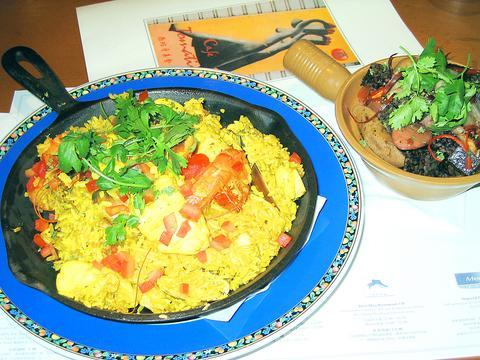OK, it's impossible to look out of the windows of the Imperial Hotel's OK, it's OK, it's impossible to look out of the windows of the Imperial Hotel's Tomatina restaurant and stare lazily at either the Guadalquivir River or the minaret of La Giralda. And it's hard, very hard, in fact, to picture oneself sitting in a bar somewhere, anywhere, in Andalucia rather than in a hotel located in one of Taipei's least picturesque districts.
That said the hotel restaurant's recent shift towards a Spanish tapas-styled joint does give Taipei residents fed up to the back teeth with faux-Italian or quasi-French chow the chance to savor something a wee bit different, especially in Taipei, where Iberian-themed eateries are scarce.
Since late last month the hotel's popular second floor restaurant -- that in previous incarnations has been an Italian, French and buffet joint -- has been serving up a selection of some of the most genuine, if not the only tapas to be found in Taipei.

PHOTO: VICO LEE, TAIPEI TIMES
For those looking for a light snack, Tomatina offers patrons a cold tapas buffet. Featuring various types of cold dishes such as Juan dory with Basque dressing, marinated mushrooms salsa, ensalada de pollo and octopus la bodego, the buffet costs NT$390 and includes dessert, soup and a beverage.
It is the a la carte hot tapas, however, which are proving to be the joint's most popular draw. Reasonably priced and ranging in price from NT$150 to NT$290, the hot tapas menu includes spicy sausages (NT$190), sauteed mushrooms (NT$200), braised monkfish (NT$280) and rosemary stewed lamb shanks (NT$280).
More hearty and warming dishes include seafood, chicken, sausage and vegetarian paellas (NT$180 to NT$220), which taste exceptional, a fantastic spicy and warming bean, blood pudding and sausage stew (NT$160) and a hefty potato, seafood and garlic mash casserole (NT$250).
To ensure that all the food served up is as authentic as possible, the restaurant imports all of the spices, the special paella rice and the sausages it uses in its tapas.
While the restaurant only "officially" sells sangria by the glass (NT$170), customers who wish to sit back and enjoy a pitcher, or possibly two, of the fashionable Spanish plonk can do so on request. Sadly the wine list has yet to catch up with the rest of the place and the only wine currently available is Chilean (NT$250 to NT$350 per glass or NT$1,200 to NT$1,500 a bottle).
An added bonus of the Imperial's tapas offerings is that because the restaurant is located in a hotel, if you fancy sitting in the hotel's lobby bar, where a wider selection of libations are available, all you need do is ask.

No one saw it coming. Everyone — including the Chinese Nationalist Party (KMT) — expected at least some of the recall campaigns against 24 of its lawmakers and Hsinchu Mayor Ann Kao (高虹安) to succeed. Underground gamblers reportedly expected between five and eight lawmakers to lose their jobs. All of this analysis made sense, but contained a fatal flaw. The record of the recall campaigns, the collapse of the KMT-led recalls, and polling data all pointed to enthusiastic high turnout in support of the recall campaigns, and that those against the recalls were unenthusiastic and far less likely to vote. That

Behind a car repair business on a nondescript Thai street are the cherished pets of a rising TikTok animal influencer: two lions and a 200-kilogram lion-tiger hybrid called “Big George.” Lion ownership is legal in Thailand, and Tharnuwarht Plengkemratch is an enthusiastic advocate, posting updates on his feline companions to nearly three million followers. “They’re playful and affectionate, just like dogs or cats,” he said from inside their cage complex at his home in the northern city of Chiang Mai. Thailand’s captive lion population has exploded in recent years, with nearly 500 registered in zoos, breeding farms, petting cafes and homes. Experts warn the

A couple of weeks ago the parties aligned with the People’s Republic of China (PRC), the Chinese Nationalist Party (KMT) and the Taiwan People’s Party (TPP), voted in the legislature to eliminate the subsidy that enables Taiwan Power Co (Taipower) to keep up with its burgeoning debt, and instead pay for universal cash handouts worth NT$10,000. The subsidy would have been NT$100 billion, while the cash handout had a budget of NT$235 billion. The bill mandates that the cash payments must be completed by Oct. 31 of this year. The changes were part of the overall NT$545 billion budget approved

The unexpected collapse of the recall campaigns is being viewed through many lenses, most of them skewed and self-absorbed. The international media unsurprisingly focuses on what they perceive as the message that Taiwanese voters were sending in the failure of the mass recall, especially to China, the US and to friendly Western nations. This made some sense prior to early last month. One of the main arguments used by recall campaigners for recalling Chinese Nationalist Party (KMT) lawmakers was that they were too pro-China, and by extension not to be trusted with defending the nation. Also by extension, that argument could be